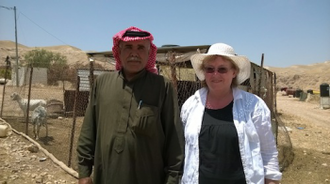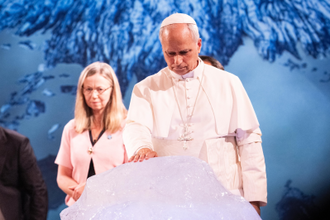Palestinian Bedouins: "international people are our voice in the world" - 6

Ellen Teague with Abu Faisal
Our small Pax Christi UK group and friends from Canada, India and New Zealand set off on a minibus today to travel from Bethlehem to Jericho, particularly to meet Palestinian Bedouin. They are the poorest of the poor in the West Bank and hence draw support from the Pax Christi network around the world, inspired by the Church's Social Teaching. The traditions of approximately 50,000 Bedouin have been nearly destroyed by Israeli policies.
How amazing to pass a monastery on the outskirts of Bethlehem built on a site where legend tells us the Magi stayed in caves rather than visit King Herod after visiting Jesus. But how sad, further along the road, to have to pass through an Israeli checkpoint. We noticed that while our bus was waved through, the occupants of a Palestinian vehicle had been stopped.
A few miles further and the town of Bethany was pointed out, but our eyes were also drawn to small makeshift settlements close to the road between the hills on both sides. These Bedouin communities try to maintain a traditional lifestyle, but it is increasingly difficult. They have their roots in the Negev desert, which they were forced to leave in 1948, rupturing their Bedouin lifestyle and severely restricting their former freedom of mobility to search for pastures and water for their herds of sheep and goats. As a consequence, the Bedouin communities began to lose not only their livelihood but their cultural identity as well. The 1967 Israeli occupation displaced them again, and they were forced to settle in the rural areas around Hebron, Bethlehem, Jerusalem, Jericho, and the Jordan Valley. Many features of the Bedouin lifestyle have undergone a radical transformation. People and animals share a very tight space and have limited access to water, land or electricity.
We stopped to visit a Bedouin school, climbing over four sets of barriers on the busy new highway to reach it. Five children from the school have been killed in recent years as the underpass to the modern road never materialised. As we climbed up the stony hill in the roasting heat we could see children assembling and singing. We were all moved when the penny dropped that the children were welcoming us. Lined up in a guard of honour and waving flags, many were wearing outfits and scarves similar to the scout movement. In fact, a group of the older children were graduating as well and we were able to congratulate them as they sat up the front of an open courtyard dressed as young scholars, complete with square academic caps.
But these educational efforts are being made in a school built of mud and tyres that has a demolition order hanging over it. The tyre school in Khan Al Ahmar was built in 2009, we were told by community spokesman Eid Jahalin, but it faces constant harrassment from an Israeli settler community nearby which is home to four Knesset members, including the Minister for Housing. After building the school, threats against the villagers increased, Eid Jahalin told us. "Settlers often destroy the fence around the school and take school property" he added "and recently play equipment given by the Italian government and new solar panels were stolen". He reported that drones fly over the school and surrounding land regularly, frightening the children. "The Israelis want to send us to live in compounds where there is not enough space for donkeys and other animals" and he urged that, "we need international contacts to support us or our village and our lives might be lost; international people are our voice in the world".
Last year saw protestors block the Jerusalem - Jericho road challenging Israeli policies to remove Palestinian Bedouin communities from this area. Bedouins fear being corralled into a new Bedouin township near Jericho, thus clearing the area for the expansion of illegal Israeli settlements. Such forcible transfer is prohibited under Article 47 of the Fourth Geneva Convention, but that doesn't mean it won't happen.
We travelled on to Jericho, where we picked up two Ecumenical Accompaniers working with the World Council of Churches who took us to a village called Nuweima. Members of the Rashaida Bedouin tribe have been living in Nuweima since their displacement from the Negev desert during the Nakba of 1948 and then the Dead Sea area.
According to village muhktar, Abu Faisal, Israel has issued numerous demolition orders in Nuweima, a community of around 750 people. Over the customary Arab coffee in a tented area shielding us from the hot sun, he told us that now the fear is that Bedouins living on land between Jerusalem and Jericho will be forcibly displaced to the Jericho area. "We will have no space left for our livestock, and we will lose our livelihood" he said. "The international community is not doing enough to support our case" he added; "Bedouins love to go of roaming with their animals and we just can't live in very compact houses and areas". He told us that life is hard already, with the young people having to go to school four miles away by foot or donkey and the constant threat that their culture will be forcibly changed. Asked whether emigration is something Bedouins consider, he responded, "Bedouins don't emigrate but the Israelis want us to". Hope still burns strong. Abu Faisal said the community is looking for funding to open a kindergarten and buy a bus.
Israeli plans have drawn international condemnation, including from UN Secretary-General Ban Ki-moon, who has stated that the proposed relocation of the more than 2,000 Bedouins, of whom two-thirds are children, would amount to forcible transfers and forced evictions, which are prohibited under international humanitarian law and human rights law.
Before leaving we wandered around the village and saw the livestock in pens. Around 150 animals need more grazing land which is denied to the community, even though there are hills all around, including the one where Jesus was tempted by the devil. Palestinian Bedouin shepherds are a minority group disdained by the Israeli occupiers of the West Bank. International organisations can offer support through campaigns for the implementation of international laws for the protection of minorities and indigenous populations.
What does all this have to do with Pax Christi International?
Today's concluding statement of its 70th anniversary International Assembly in Bethlehem said: 'Pax Christi International encourages Palestinian and Israeli human rights and peace organisations to continue their work for a just peace in the Middle East based on human rights and international law and proclaims its solidarity with these groups. Pax Christi encourages all pilgrimages to the Holy Land to engage with the local people of Palestine.'


















